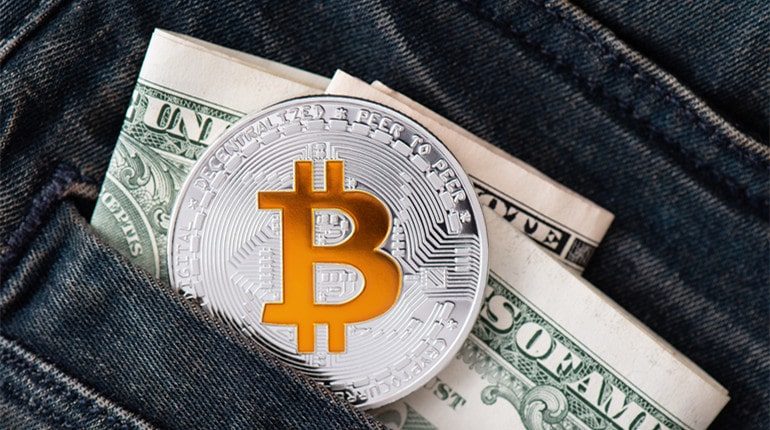Bitcoin, the pioneering cryptocurrency, has been a game-changer in the world of finance, leading many to ask the question: can Bitcoin be used as real money? The answer is a definite 'yes,' but it requires a nuanced understanding of what constitutes 'real money.' Real money refers to a legal tender recognized by the government, which can be used for transactions and stored as wealth. Even though Bitcoin does not fit into the traditional definition of real money, it does possess currency characteristics and is increasingly being accepted as a medium of exchange. In this article, we will delve into the different ways Bitcoin can be used, the businesses and services that accept it, and how it is gradually carving a niche in the conventional financial system.
What Is Meant by the Term 'Real Money'?
Can Bitcoin be used as real money? This question carries significant weight in economic discussions. However, despite its pervasive use, the term 'real money' is often misunderstood or misinterpreted. To fully understand how Bitcoin is gradually establishing itself as a viable form of money, we must first understand what real money means in traditional economic terms. In its simplest form, real money refers to the physical coins, notes, and digital forms of currency issued by the government of a country and accepted universally within its borders. It is a form of exchanged value, recognized as a legal tender, which means it is backed by an authoritative body—typically the government—and is accepted to settle debts. Real money has three defined areas of functionality, which we shall explore: as a store of value, an accounting unit, and a medium of exchange. However, it's important to note that the concept of real money has evolved. Money was initially based on physical commodities like gold or silver, known as commodity money. Then, we moved to representative money, backed by a physical commodity. Today, most money is fiat, which holds value because a government maintains its value or because two parties agree.
Exploring Bitcoin and Its Credentials as Real Money
Bitcoin, often regarded as digital gold, is a type of cryptocurrency invented in 2008 by an unknown individual or collective operating under the name Satoshi Nakamoto. At its core, it is a decentralized digital currency with no central bank or single controller. Transactions are conducted peer-to-peer on the Bitcoin network without the need for intermediaries. Network nodes verify these transactions by solving cryptographic puzzles, and the results are recorded in a publicly distributed ledger called a blockchain. One might wonder how this virtual money can be equated to real money. To understand this, we need to go back to the primary attributes of money: serving as a medium of exchange, an accounting unit, and a store of value.
Medium of Exchange:
Bitcoin is increasingly being accepted as a medium of exchange. Many businesses worldwide accept Bitcoin as payment for goods and services, alongside traditional currencies. This acceptance is not yet widespread, and the volatility of the Bitcoin market somewhat limits its effectiveness as a medium of exchange, but the trend is growing.
Accounting Unit:
An accounting unit, or unit of account, is a standardized unit of measurement applied to the market value of transactions, for example, those made for goods or services. Being divisible, fungible, and countable, Bitcoin can serve as a unit of account. However, its acceptance as a unit of account is limited because of its high volatility. It's hard to price goods and services in Bitcoin when the value of Bitcoin itself fluctuates wildly.
Store of Value:
The most frequent comparison when discussing this topic is to compare Bitcoin to gold as a store of value. Just like gold, there is a limited number of Bitcoins (21 million Bitcoins, to be exact), and mining (creating new Bitcoins) is getting more challenging over time, mirroring gold mining. Because of its scarcity, many people buy and hold Bitcoin, hoping its value will increase. However, it's important to note that Bitcoin's value is highly volatile and can decrease as quickly as it can increase. While Bitcoin does not fit the traditional definition of real money, it fulfills some functions of money. It is accepted as a form of payment by many businesses. This trend indicates a shift in our understanding of what constitutes 'real money.' As Bitcoin and other cryptos evolve and gain acceptance, they could reshape the future landscape of global finance and redefine our answer to the question, can Bitcoin be used as real money?

Using a Bitcoin Debit Card: Spending Bitcoin Like Real Money
Can Bitcoin be used as real money? In recent years, the advent of Bitcoin debit cards has made spending Bitcoin increasingly similar to spending real money. These cards function much like traditional debit cards, allowing users to make transactions and withdrawals using Bitcoin. In essence, they facilitate the seamless conversion of Bitcoin into fiat currency, thus enabling its use for everyday purchases.
How Bitcoin Debit Cards Work
A Bitcoin debit card is funded with a digital wallet storing the user's Bitcoin. When a transaction is made, the card converts the necessary amount of Bitcoin into the local fiat currency. The exchange rate at the time of the transaction determines the value of the conversion. This process enables users to spend Bitcoin, like cash, at any merchant that accepts regular debit or credit cards.
Bridging Bitcoin and Traditional Finance
Bitcoin debit cards are critical in bridging the gap between the digital currency world and traditional finance. For many, the complexity of Bitcoin transactions and the volatility of its value can be daunting. Bitcoin debit cards simplify this process, making Bitcoin more accessible and practical for everyday use. They essentially allow Bitcoin to be used indirectly in places not yet accepted. This facility means you can shop at your favorite grocery store, dine at local restaurants, pay for online services, or even withdraw cash at ATMs using Bitcoin.
Overcoming the Volatility Hurdle
One of the significant challenges of using Bitcoin as real money is its volatility. The value of Bitcoin can shift dramatically within short periods, creating uncertainty about its purchasing power. Here, too, Bitcoin debit cards offer a solution. By converting Bitcoin to fiat currency at the time of the transaction, users can spend Bitcoin without worrying about its current value. This feature brings stability and predictability, much like spending real money.
Enhancing Bitcoin Liquidity
Bitcoin debit cards also enhance the liquidity of Bitcoin. Liquidity refers to how speedily and easily an asset can be converted into cash. Although Bitcoin can be traded on numerous exchanges, converting it into cash can be time-consuming. Bitcoin debit cards streamline this process, making spending more convenient and quick. While Bitcoin's status as 'real money' continues to be debated, the development and adoption of Bitcoin debit cards undeniably bring it closer to this definition. By enabling Bitcoin to be spent like real money, they are shaping a future where digital currencies coexist and compete with traditional fiat currencies. Bitcoin debit cards bridge the gap between the cryptocurrency and traditional financial worlds, overcoming Bitcoin's volatility and enhancing its liquidity. As more people adopt these cards, the line between Bitcoin and real money will likely blur further. Consequently, as Bitcoin debit cards become more mainstream, they might redefine our understanding of 'real money.'
Can Bitcoin Be Used as Real Money by Spending It Directly?
The digital revolution has brought with it a new era of finance. Bitcoin, the trailblazer of cryptocurrencies, has been steadily gaining acceptance as a direct form of payment. While it's true that Bitcoin debit cards have eased the spending ability of Bitcoin and bridged the gap between cryptocurrency and traditional finance, the growth of direct Bitcoin spending is also a testament to the increasing acceptance and understanding of this digital asset. Here, we delve into how Bitcoin can be spent directly and the industries and companies that have paved the way.
Tech and e-commerce industry:
In the technological and e-commerce industries, Bitcoin is increasingly accepted as a viable payment option. Renowned tech giants such as Microsoft and Newegg are leading this trend. Microsoft, for instance, allows customers to deposit Bitcoin into their Microsoft accounts, which can then be used to purchase games, movies, and apps in the Windows and Xbox stores. On the other hand, Newegg, a significant online retailer focused on computer equipment and consumer electronics, offers Bitcoin as a payment option during checkout. This development is modernizing how these industries operate and broadening their customer base to include tech-savvy cryptocurrency users.
Travel and tourism industry:
The travel and tourism industry is another sector where Bitcoin is becoming prevalent. Companies like Expedia and CheapAir have started accepting Bitcoin for their services. Expedia, a leading online travel booking agency, allows customers to pay in Bitcoin for hotel bookings. They collaborate with Bitcoin payment service providers to facilitate smooth transactions. Similarly, CheapAir, an online travel agency, has been accepting Bitcoin for flight and hotel bookings since 2013, making it a pioneer in adopting cryptocurrency. This move broadens their customer base and opens more diverse payment options.
Food and beverage industry:
Bitcoin is gaining momentum as a payment method in the food and beverage industry. Starbucks, for instance, has launched a pilot program allowing customers to convert their Bitcoin into fiat currency that can then be loaded onto a Starbucks card for purchases. Similarly, PizzaForCoins, a service that orders pizza from local shops and delivers it to customers, accepts Bitcoin as payment. This facility caters to a more tech-savvy demographic and attracts new customers who prefer using Bitcoin for transactions.
Real estate and luxury goods:
The real estate and luxury goods industries are also embracing Bitcoin. Several real estate companies worldwide accept Bitcoin for property transactions, catering to a growing demographic of digital currency users. For instance, in Dubai, the real estate developer Knox Group announced properties that can be bought exclusively with Bitcoin. Additionally, luxury goods companies, such as The White Company and BitDials, offer high-end products like luxury cars, watches, and jewelry for Bitcoin, making these luxury experiences accessible to cryptocurrency holders.
Cryptocurrency exchanges and Peer-to-Peer transactions:
Platforms like the PlasBit crypto exchange allow users to buy, sell, and trade Bitcoin, enhancing its liquidity. Bitcoin's decentralized nature also facilitates peer-to-peer transactions, enabling users to transact directly with each other. This form of transaction is becoming increasingly popular, especially in countries with unstable financial systems, but it does come with risks.
Charitable donations:
Notably, accepting Bitcoin donations enables charitable organizations to streamline the donation process and eliminate traditional banking fees. Bitcoin's decentralized nature also ensures that donations reach their intended destination without interference or unnecessary delay. Furthermore, Bitcoin donations are transparent and traceable, giving donors and organizations a clear transaction history. Organizations like the Wikimedia Foundation, United Way Worldwide, and The Water Project have also recognized the potential of Bitcoin and have started accepting donations in this digital currency. Bitcoin also offers an added advantage of tax benefits in certain jurisdictions, as crypto donations are often considered non-taxable events. A growing number of charities are, therefore, turning to Bitcoin donations, not just for their financial advantages but also to promote digital literacy and inclusiveness in the financial system. This emerging trend highlights the increasing acceptance of Bitcoin in diverse economic sectors. Bitcoin's growth as a direct form of payment is undeniable. Many industries and companies recognize and integrate its potential into their payment systems. The dynamics of Bitcoin spending are evolving, and it's clear that the cryptocurrency is carving out its own space in the financial ecosystem. As more industries join the fold and accept Bitcoin as a payment method, the narrative of Bitcoin as 'real money' continues to strengthen. For example, using a crypto wallet like we provide to securely and safely pay for goods and services is simpler than ever.
Case Study: How Justin Leverages PlasBit to Spend Bitcoin Like Real Money
An avid cryptocurrency enthusiast, Justin discovered the potential of spending Bitcoin like 'real money' through our platform. This case study explores Justin's journey from using Bitcoin for everyday shopping to making substantial purchases like luxury cars.
Discovering PlasBit
With a keen interest in the digital economy, Justin had accumulated a substantial amount of Bitcoin. However, he was unsure how to utilize it for his everyday needs. That's when Justin discovered our PlasBit, geared towards bridging the gap between cryptocurrency and real-world spending. He learned more about crypto on our site and tracked the success of his investments with our price ticker and profit calculator tools.
Everyday Shopping with Bitcoin
Justin began his journey by using our Bitcoin debit card for everyday shopping. The card allowed him to convert his Bitcoin into local currency instantly, enabling him to shop at his favorite stores without any hassle. Justin found this feature incredibly convenient, allowing him to tap into his Bitcoin holdings for everyday expenses, making his cryptocurrency more than a speculative asset.
Broadening Payment Options
As he continued to use the Bitcoin debit card, Justin found that an increasing number of retailers were accepting Bitcoin directly from his crypto wallet. This trend was a game-changer, saving him fees and making his transactions more efficient. The ease and flexibility of these transactions significantly enhanced Justin's shopping experience, making him feel more connected to the evolving digital economy.
Big Purchases with Bitcoin
Emboldened by his success with everyday spending, Justin decided to use his Bitcoin for a more significant purchase - a luxury car. Using PlasBit's platform, he could quickly convert his Bitcoin into the local currency and make a wire transfer for the whole car purchase amount. This seamless transaction was a turning point for Justin. He realized that his Bitcoin was not just a digital currency but a valuable asset with real purchasing power. This understanding encouraged him to explore other avenues for spending his Bitcoin, expanding its usability beyond his initial expectations. Justin's experience with Bitcoin spending is an excellent example of how cryptocurrency is gradually becoming a part of everyday life. More than just an investment or a speculative asset, Bitcoin is emerging as a viable payment option, accepted by many retailers and service providers. Through platforms like PlasBit, users like Justin are discovering the true potential of their cryptocurrency holdings and integrating them into their daily lives. As the lines between digital currencies and traditional financial systems continue to blur, the digital economy is becoming more accessible and practical in answering the question, can Bitcoin be used as real money?
Bitcoin Spending: Embracing the Future of Finance
Bitcoin's increasing acceptance as a medium of exchange demonstrates its potential to function as 'real money.' At the same time, it may not fit the traditional legal tender definition, but its characteristics and growing usability parallel that of conventional currencies. Platforms like PlasBit are making it easier for users to spend Bitcoin in everyday transactions, from grocery shopping to buying luxury cars. Charitable organizations also embrace Bitcoin, appreciating its benefits, such as eliminating banking fees and promoting transparency. The tax benefits and the promotion of digital literacy further enhance its appeal. As more businesses and services accept Bitcoin, its influence within the financial system continues to grow. As we move towards a more digitized world, Bitcoin's role as an alternative and efficient financial instrument will likely strengthen. The story of Bitcoin's evolution continues, shaping not just the future of finance but also redefining what we consider 'real money.'







